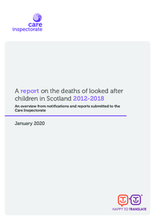Displaying 531 - 540 of 2221
This paper offers a conceptually informed analysis of fostering and adoption social work and argues for more consistent inclusion of trans and non‐binary people.
For this study, the researchers conducted 11 semistructured focus groups with 86 foster and kinship caregivers in three child welfare jurisdictions to understand their strategies for monitoring and communicating with youth in foster care around sexual health topics, with the overall goal of developing a training for caregivers to reduce STI and unintended pregnancies among youth in foster care.
This review identifies if physical activity interventions are effective for children in out of home care, and if so which type of activity and for what health outcomes.
This qualitative study examines the challenges foster caregivers face within their families and seeks to understand their formal and informal support systems so that future trainings may be created to provide for the specific and realistic needs of foster caregivers.
This study examined the long-term effects of the Head Start early childhood program on foster children's developmental outcomes from ages 3–4 to 8–9.
Drawing on a large‐scale online survey of looked after children's subjective well‐being, this paper demonstrates that a significant number of children and young people (age 4–18 years) did not fully understand the reasons for their entry to care.
Drawing on a large‐scale online survey of looked after children's subjective well‐being, this paper demonstrates that a significant number of children and young people (age 4–18 years) did not fully understand the reasons for their entry to care.
This report draws attention to themes emerging from notifications of the deaths of 61 care experienced children and young people over seven years from 2012 to 2018.
This paper reports findings from an innovative arts-based intervention with Looked After Children and Young People and concludes that holding these competing value sets in creative tension is central to the success of the programme in helping young people to cope with and contest social harm.
This article argues that the patchwork of legal protections across U.S. states means that many LGBTQ-headed families lack needed security, stability, and legal recognition.

